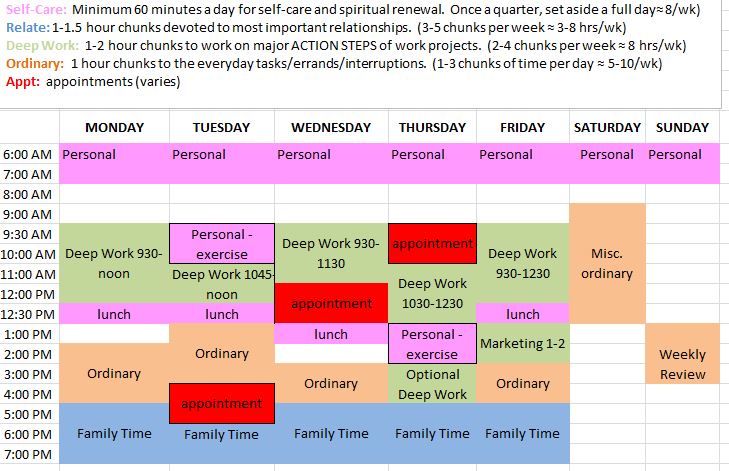
Newsflash! We all have the same amount of time every day.
Time is an unchanging, consistent resource. You can’t make more of it….but it sure is easy to waste it! And once it’s gone – it’s gone.
Everyone begins each week with the same clean slate – the same time budget of 168 hours. Are you going to plan ahead, setting aside some time for a rainy day and ensuring that the most important things (and people) in your life are invested in regularly, day by day?
Too many people launch into the week being tossed back and forth by whatever demands pop up. I’ve seen people reach the end of the week so frazzled and exhausted that they spend all their “free time” on the weekend just trying to recover from the chaos of the previous week.
To-do lists reach epic proportions and just grow longer and longer by the end of the week. When you put an effective planning system into action in your own life, you will soon see how much control you actually have over those precious hours each day!
I want to share the simple system I use (and which I’ve helped my clients use) with great results! When you implement it and follow-through you will soon find yourself enjoying the benefits of greater progress and results in the things that matter most to you!
Before we get into the “nuts and bolts” (or, “building blocks”) of planning a productive week, spend some time thinking about your life overall.
This is REALLY important!
Don’t jump into planning a schedule or a calendar before you’ve gotten crystal clear on what’s most important to you….where you want to “end up”! Otherwise, it’s like an airplane pilot in New York just getting into the cockpit and taking off and thinking “Hmmm…..I wonder where I will end up today?Well, at least I left the gate on time!” How silly that would be?!
I have created a very simple life assessment that will help you as you reflect on the different key areas of life. Take 10-15 minutes to complete this self-assessment and prayerfully ask God to guide you to the areas of your life where you should focus your attention now and in the coming year. You can download the “How’s Your Balance” assessment for free right here!
Once you’ve done that and spent some quiet time getting a clear idea of where you want to zero in with the dedication of your precious time, come back here! I’ll wait for you….. (wink)
Welcome back! Now let’s get started!
Have some FUN with this by thinking of your time as a big pile of plastic building toys, just waiting for you to put them together in a way that sets you up for maximum personal and professional success and genuine progress towards your desired destination!

I use a simple planning system that focuses primarily on standard “workday” hours between Monday-Friday (although you can personalize it and implement it to fit whatever your unique situation!)
I’ve broken down life activities into 4 general categories:
1. Self-care – taking care of your mind, body, soul and spirit
2. Relationships – your most important relationships
3. Deep Work – professional/personal goals or projects on which you want to make real progress.
4. Ordinary Time – everyday tasks, errands, interruptions
OK, let’s start building our week!
To keep it simple, each building piece represents a one hour chunk of time. Imagine that you have four different color piles of these building blocks (one pile for each of the 4 categories.) You may end up with more (or less) of each color, depending on how you decide to “play the game” each week! Here are my recommended guidelines to get you started….
- Self-care – Spend a minimum of one hour a day for self-care and spirit/heart renewal. Once a quarter, set aside a full day. Your weekly self-care quota should be a minimum of 7 hours (more is better!)
- Start with 3-8 Relationship “time chunks” for each week.
- Then every week, shoot for approximately 8 Deep Work “chunks.”
- Finally, go with 5-10 Ordinary Time “chunks” every week.
Each week, by planning your 4 primary “chunks” (categories) of activities into your calendar….voila! You suddenly have more free time than you ever realized!
I recommend you develop a “sample week” – your “dream week.” This would be your week in an ideal world, which rarely exists most weeks but is a very important foundation from which you will build out your reality each week.
Here’s a sample of what an ideal week might look like. Keep in mind….this is merely a very rough sample, just to get your creative planning juices flowing! The “white space” = margin and “flex” time.

Here are some essentials to keep in mind for this system to work and help create more free time for you:
- Make taking care of yourself a priority and plan for it in your calendar. If it’s not on the calendar, it doesn’t get done!
- Honor your commitments to yourself. If you have a “deep work” chunk scheduled every Monday morning, let everyone know that you are not available during those two hours.
- Learn to say “no” – or “later” to people.
- Turn off your computer, your email and your phone during the chunks you’ve scheduled.
By doing this, you will truly make the most of that specific chunk of time – becoming more and more productive (if it’s project/work related) and more “present” (when it’s relationship time, or time for your own well-being).
If you follow the general guidelines as far as how much to schedule per week in each category and then do the math, you’ll see that it works out this way:
168 hours in a week minus 56 hours of sleeping (8 hours a night) =112 hours.
112 hours minus 33 hours (the max for each of the 4 categories) = 79 hours FREE
…….to do more self-care, exercise, date nights, hobbies, cook, play, help aging parents, have more flexibility.
So, if you knew that each week you would have 8 uninterrupted “deep work” hours devoted entirely to your most important projects – no Facebooking, no texting, no online shopping – how much would that impact your professional goals?
There are unlimited productivity “hacks” that we will get into in the future (don’t get me started on technology addiction!)….but this planning and follow-through habit alone can be a game-changer for you. So, here’s a summary/checklist:
- Use the FREE Life Balance Assessment to help you get clear on your most important things.
- Create your “dream week.”
- Plan/play with your time chunks based on the guidelines.
- Honor your commitments to yourself
- Evaluate how it went at the end of each week. Experiment, tweak, adjust as necessary.
- Rinse and repeat each week!
Now, go out and enjoy some of that free time you just created in your life!

